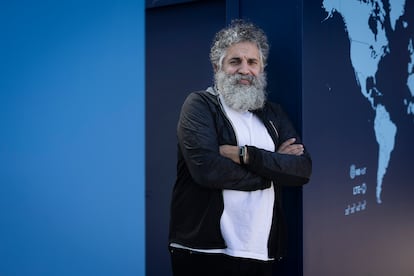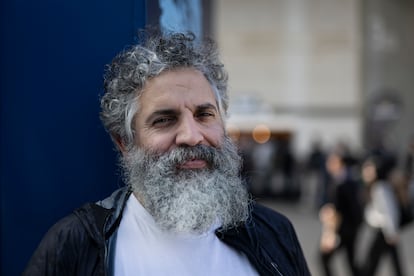Technologist David Cuartielles: ‘Regulations enhance safety, despite sometimes posing challenges to innovation’
Arduino’s co-founder supports open-source technology and calls for a balance between product innovation and data protection

David Cuartielles stood out among all the suited executives at the 2024 Mobile World Congress held in Barcelona in late February. The professor with the unruly beard and co-founder of Arduino, an Italian open-source hardware and software company, didn’t look and talk like everyone else. Cuartielles has taught computer science and electronics for years at the Mälmo University (Sweden), while his company continues to challenge the industry with its innovative computer boards that eschew traditional licensing models.
Question. Are you and your company going to move on from the students?
Answer. No, we’ll keep going, aiming to better connect research with the industry. Arduino was made for university students, yet we found the language we created was easily used at earlier education levels. Our goal was to foster an engineering discussion in design and art, but it grew beyond to other fields.
Q. Aren’t you afraid of abandoning your roots?
A. Obviously! But when you run a company, you hire people who have bills to pay, you know? Making sacrifices is part of the deal. It’s all about seeing your team grow with the company, rather than watching them walk out because they’re not getting paid what they’re worth. But I’m okay with all the decisions we’ve made so far.
Q. You have always been committed to open-source technology, which has never gained much traction in traditional companies.
A. One key strategy in industrial technology has been keeping customers hooked with closed-door practices. Our approach is different — we attract customers by offering boards that can be completely customized.

Q. Does the mainstream industry understand this?
A. Some clients are beginning to understand it, yeah.
Q. You advocate for open-source technology because it’s a different way of doing things, right?
A. Our philosophy is simple — use tools you know. When Apple created the first iPhone, they believed you couldn’t build an app on a non-Mac computer without their XCode system. Me and some other people were interested in using other software, but Apple made that impossible — they aimed for total control over the user experience.
Q. From an outsider’s perspective, how do you feel about being at this congress, where most people oppose your views?
A. I realize I have a different perspective from many people here, but I don’t feel bad about it, nor do I think ours is the wrong approach. We’ve secured investments in our company, which demonstrates our potential for success.
Q. Is there a generation of native Arduinos out there?
A. It’s amazing. When we hire engineers now, we only look for people with Arduino experience. Initially, we couldn’t do that. But now we’ve been in the market long enough to be able to recruit people who grew up and learned with us.
Q. Was that the goal?
A. My main goal was for my daughter to learn more than just Word or Excel in school. Two years ago, she not only learned Arduino but also taught it to other kids at school. If the company shut down tomorrow, I’d be at peace. I’ve achieved my goal.
Q. Everyone is hoping for a boom from the Internet of things. Do you believe this leap is wholly beneficial for society?
A. The university department in which I work is called the Internet of Things and People. It can be a very useful if it is applied properly. But some parts of it lack a critical understanding of technology application. European regulators are making strides in privacy technology so it isn’t misused. Balancing product innovation and data protection is crucial for enhancing lives without compromising privacy.
Q. Many companies and people claim that excessive regulation in Europe hinders innovation.
A. Regulation is necessary. As an academic, I believe regulations enhance safety, despite sometimes posing challenges to innovation. Europe has established a complex legal framework that protects people. Regulations help us make the right decisions, though mastering the necessary knowledge can be complicated. We have to be smart about innovation.
Sign up for our weekly newsletter to get more English-language news coverage from EL PAÍS USA Edition
Tu suscripción se está usando en otro dispositivo
¿Quieres añadir otro usuario a tu suscripción?
Si continúas leyendo en este dispositivo, no se podrá leer en el otro.
FlechaTu suscripción se está usando en otro dispositivo y solo puedes acceder a EL PAÍS desde un dispositivo a la vez.
Si quieres compartir tu cuenta, cambia tu suscripción a la modalidad Premium, así podrás añadir otro usuario. Cada uno accederá con su propia cuenta de email, lo que os permitirá personalizar vuestra experiencia en EL PAÍS.
¿Tienes una suscripción de empresa? Accede aquí para contratar más cuentas.
En el caso de no saber quién está usando tu cuenta, te recomendamos cambiar tu contraseña aquí.
Si decides continuar compartiendo tu cuenta, este mensaje se mostrará en tu dispositivo y en el de la otra persona que está usando tu cuenta de forma indefinida, afectando a tu experiencia de lectura. Puedes consultar aquí los términos y condiciones de la suscripción digital.









































